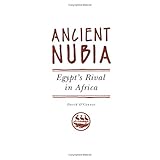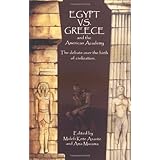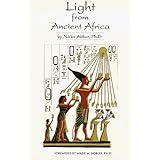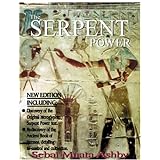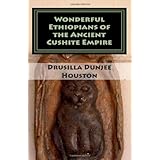
Average Reviews:

(More customer reviews)My rating represents the average of full stars plus bonus stars for pushing the envelope with revealing information absolutely unmissable and minus stars for too much reliance on insufficiant circumstantial evidence and deeply biased attitude thresholding sick into racism, classism, religionism and culturalism.
"Exiled Egyptians" focuses on the Egyptian exoduses caused by Muslim conquerors to the West African sub-Saharan region. It is not about the Moses/Akhenaten exodus, not about the Roman-caused exodus, and not about the spread of any exodus into Europe, the Americas or East and South Africa. The book reveals cultural, architectural, agricultural, linguistic and religious influence of the ancient/medieval Egyptians over mostly the West African peoples, but also the (underground) Egyptian culture of today. A lot of original meaning of vocabulary, such as commonly known peoples' names, gets revealed. Faked history records get exposed, and downpressed history doors are pushed open. No matter the serious flaws I am about to list, this book is nevertheless a must read till the time a better one of this (un)kind is written. Whenever that may happen, then this book will have to get discarded as biased, hostile und scientifically lacking. With one notion in the preface, the author is absolutely right though: "In the end, probably all the various groups will be equally angry [with this book]."
As usual for a book by Moustafa Gadalla, this one is Egyptcentrist. That's a decisive difference to being Afrocentrist or Blackcentrist. For basically, he rejects harshly ANYTHING else than ancient Egyptian culture. This book, however, gets really unbearable in this context. Some examples, of what he thinks of other peoples, cultures and religions: terrorists, gangsters, locusts, stupid, little cultured, barbarian, show only their cold-blooded eyes, primitive beliefs, polluting the ancient Egyptian language with vocabulary, evil, etc. I will not say which Black African, Arab African, European or other peoples and religions he is specifically referring to, as I do not like to repeat insults. Basically, everyone gets hurled an insult at like that.
Some readers blind themselves. Because they venerate (Black) Egypt and like to read about high cultures in Africa, Western history is omitting, they are closing their eyes towards the blatant racism of this book. To begin with, the author believes in races, to the abyss of claiming (even pre-colonial) Africa within itself would be full of different ones, even some of obscure origin. Very selectively, he is using vocabulary for peoples, they do not like to get called by: "Tuaregs", a derogatary term applied to them by the Arabs, call themselves by many names, for example Kel Tamasheq ("Speakers of Tamasheq"), Imuhagh/Imashaghen ("the Free People") or Kel Tagelmust ("People of the Veil"). In an inconclusive context, he calls the Khoisan "Hottentott", a term apllied to them by Dutch colonialists, meaning "stutterers", because they misjudged the click-sounds and frequent syllable doublings. In the context that the book meticulously lists all the correct names of Egyptian-based names of peoples, even giving the correct pronunciataion of the word "Tuareg" ["Twahreg"], this is really something. The book doesn't like the historic behavior of some Imuhagh and looks down on the "San" peoples - all of our ancestor peoples - and therefore finds it legitimate to call them by insults. Not only does he claim, the Bible would say, all Blacks are the descendants of Ham (in reality, that has been an arbitrary and intentional MISINTERPRETATION of the Bible to excuse slavery), the author in all sin-cerity uses the term "Hamites" accordingly. While informing that some West Africans call other Black people "White" because they look white except for the literal skin color, the author terms those "White Blacks" as having fine features. As in opposition to other Blacks. Which would make the latter feature what: Coarse or rough faces?! If I may say so: Every phenotype conceivable is perfectly able to produce fine features. But that is probably inconceivable for someone who uses the N-word in his book as sick. Other comments about Jews and Berbers aren't exactly Africancentered either.
But it gets better yet, when the book turns to colonialism. Before the arrival of European imperialism, Africa would already have been a dark continent of slave raiding, fragmentation, wars and misery. Caused by 900 years of Islamic colonialism, whereas the European Christians would have engaged in a much lighter colonialism for a few decades only. In fact, most Africans would have been relieved to see Europeans prevent more Arab atrocities. I never imagined that that what Germans often claim euphemistically about their in reality grave role in colonialism could be projected onto another level. Now, I have read everything! The book goes on about one of the Saharan peoples as having been "highway robbers", before the saving French arrived.
And yes, it gets worse. Slavery would have existed in Black Africa before all of that, but in a lighter version. Which to certain extent is true. But get this: By no means it would have been a hardship and the slaves would have enjoyed amicable relationships with their masters. If I overstand correctly, to be re-introduced or something. Yet, this Aunt Jamina-Uncle Tom attitude gets completely out of hand, when the book lobbies for the worst classism I have ever had to read in a modern book. There should be divisions of labor in society, based on hereditary criteria, as skills and other abilities would get inherited. A caste system would be for the people's own good and for that of society as a whole. Schooling would be a waste, (not for any miseducation reason, but) because the different castes would not need to learn anything the respective other castes need to learn. That sure isn't Blackcentered, considering that the existing caste system, the one in India, had been introduced for blatantly racist reasons.
Now for the difference of Black/Africancentrism and Egyptcentrism. I venerate ancient Egypt, otherwise I wouldn't have bought this book and appreciated the information provided. However, it clearly crosses the line when claiming that ALL the "high cultures" of Africa, from West Africa to East Africa to Great Zimbabwe would have been entirely the result of Egyptian migration, with no influx of any other peoples whatsoever. He claims EVERY ONE of those cultures would be the spitting image of Ancient Egyptian culture. Well, in some cases yes, but hardly in all. Read When We Ruled: The Ancient and Medieval History of Black Civilisations for clarification on the differences. Please note, that this book doesn't consider ancient Egyptians as Black either. And IF somehow, then not as REALLY Black. The author is basically suggesting, the however "white" Egyptians got absorbed by the Black Africans after the exodus. This is what he has to say about one Black West African people, he is claiming not to derive from Egypt (against its own claim of heritage): It would be an uncultured, gloomy people, who don't sing or dance. Who couldn't be from Egypt, for there would be no nomads in Egypt, and never have been. In addition, all nomads would war, which Egyptians don't do. Which is even wrong as there are various "Gypsy" peoples in Egypt, including nomads, of course of Egyptian origin. And the continental European nomad Gypsies are about the only people on that "continent" known to have never engaged in any war. Anyway, ancient Egyptians may have influenced a lot of cultures. That doesn't make all African cultures (entirely) Egyptian. The parallel vocabulary he mentions, means nothing the way presented, as they are limited to a dozen or so words. Words like French "mer" (sea) or German "Natur" (nature) are derived from ancient Egyptian as well. Christianity (and the other world religions) are derived from ancient Egyptian religion, as are all the monuments in Washington D.C. and the pyramid on the Dollar bills. In other words, the entire rest of Africa may be no more or less Egyptian than the Western world. Which is not to say, this book is necessarily wrong about the general idea of the Egyptian exodus to other parts of Africa. I am just concerned about the occasional lack of provided real evidence in this specific book.
Evidence, which gets discredited occasionally by superficial claims. Dwarfs brought to Egypt would have been treated with great care and respect. Anybody who uses this vocabulary instead of the people's name, disqualifies themselves to begin with. All I can say is that another source provided the information that individuals of the so-called Mbutis have been carried to Egypt during an ancient expedition in a cage - next to a cage with baboons. Though there is an Egyptian glyph venerating "dwarfs", there is also one venerating the baboons. Another claim is that only Judaism, Christianity and Islam practice human sacrifice. Because of the Abraham story, ALMOST sacrificing his son. Note the present tense of "practice", while the author is very specific about past and present in any other context. He also claims, beneath the thin facade of Islam, there would be many secret societies of the ancient Egyptian religion all over Africa, most certainly in Egypt. He can't provide more information, because of supposed security reasons. The evidence he does provide concerns old Egpytian rituals incorporated into Egyptian Islam. Well, if that would be sufficient, I could claim, there are many secret societies of ancient European religions beneath a thin layer of Christianity, because Easter (bunnies), Christmas (trees) and Carneval aren't really Christian by origin and dates, but ancient European traditions incorporated into it. The...Read more›
Click Here to see more reviews about:
Exiled Egyptians: The Heart of AfricaRead about the forgotten ancient Egyptians, who fled the foreign invasion and religious oppression. Read how they rebuilt the ancient Egyptian model system in Africa. Understand the genius of the ancient Egyptian/African religious, social, political, and economical systems, and their extended application into sub-Sahara Africa. Find out how a thousand years of Islamic jihads have fragmented and dispersed the African continent into endless misery and chaos. A comprehensive reference with six different Library of Congress subject categories.

Click here for more information about Exiled Egyptians: The Heart of Africa















